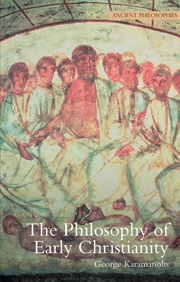Book contents
- Frontmatter
- Dedication
- Contents
- Preface
- Abbreviations
- Chronology
- Introduction
- 1 The Christian conception of philosophy and Christian philosophical methodology
- 2 Physics and metaphysics: first principles and the question of cosmogony
- 3 Logic and epistemology
- 4 Free will and divine providence
- 5 Psychology: the soul and its relation to the body
- 6 Ethics and politics
- Conclusion
- Appendix: the protagonists
- Notes
- Further reading
- Bibliography
- Index
5 - Psychology: the soul and its relation to the body
- Frontmatter
- Dedication
- Contents
- Preface
- Abbreviations
- Chronology
- Introduction
- 1 The Christian conception of philosophy and Christian philosophical methodology
- 2 Physics and metaphysics: first principles and the question of cosmogony
- 3 Logic and epistemology
- 4 Free will and divine providence
- 5 Psychology: the soul and its relation to the body
- 6 Ethics and politics
- Conclusion
- Appendix: the protagonists
- Notes
- Further reading
- Bibliography
- Index
Summary
The philosophical agenda
Christians share the generally agreed thesis among philosophers in antiquity that animals, including man, consist of soul (psychē) and body and that the soul accounts for life and all living functions of a living body, such as nourishment, perception and movement. They also agreed that the soul includes a part that accounts for thinking and related functions such as memory, for instance, that is, the intellect (nous). Plato speaks of the rational part of the soul in Republic IV and as a special, intellectual and immortal kind of soul in Timaeus (41c, 89e–90a); Aristotle speaks of the intellect as the part of the soul that knows and understands (De an. 429a9–10); the Stoics claim that there is a commanding part (hēgemonikon) of the soul (SVF II.836), and even the Epicureans appear to distinguish a rational and an irrational part of the soul (Lucretius, De rerum natura III.136–42). Agreement among ancient philosophers stops here, however. There was much disagreement among them about the nature of the soul and also about its relation to, and operation in, the body. Let us look more closely at the points of disagreement, which the Christians inherit to some extent.
- Type
- Chapter
- Information
- The Philosophy of Early Christianity , pp. 181 - 213Publisher: Acumen PublishingPrint publication year: 2013

